| Date |
Information |
|
| 11/01/2021 |
Family: William Burrowes, Mary Burrowes, Elizabeth Burrowes (born 3rd February 1877), Ada Eleanor Burrowes (born 17th April 1879), William Burrowes (born 26th December 1881), John Burrowes (born 6th November 1882), Hamilton Hugh Burrowes (born 2nd June 1885). |
| 11/01/2021 |
John Burrowes was born on 6th November 1882. He was the second youngest of five children, all born in Dungannon. |
| 11/01/2021 |
The 1901 census lists John as age 18, living with the family at house 5 in Perry Street, Dungannon. John was a drapery salesman. His father William was a confectionery shop owner. William was also a Car Owner and Driver. |
| 11/01/2021 |
1906, John became a member of St John’s Masonic Lodge No 185, Dungannon. |
| 11/01/2021 |
It seems Johns father died either on 30th March 1907 or 8th January 1908 in Dungannon. |
| 11/01/2021 |
John ‘Jack’ Burrowes emigrated to South Africa where he entered into trade in Johannesburg and had considerable farming interests up country. |
| 11/01/2021 |
The CWGC record Corporal John Burrowes as the son of Mary Burrowes of Hillside, Dungannon, County Tyrone, Ireland. He is also listed as the son of the late William Burrowes. |
| 11/01/2021 |
Corporal John Burrowes is commemorated locally on Dungannon War Memorial. |
| 11/01/2021 |
John Burrowes was the son of William and Mary Burrowes. William Burrowes and Mary Hamilton were married on 25th May 1875 in the district of Dungannon. |
| 14/10/2018 |
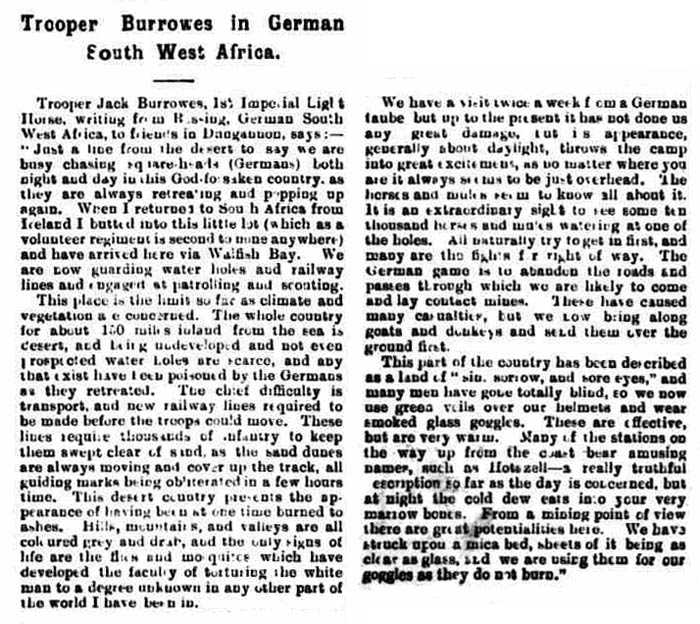 |
| 14/10/2018 |
We have a visit twice a week from a German taube (plane), but up to the present it has not done us any great damage, but it’s appearance, generally about daylight, throws the camp into great excitement, as no matter where you are it always seems to be just overhead. The horses and mules seem to know all about it. It is an extraordinary sight to see some ten thousand horses and mules watering at one of the holes. All naturally try to get in first, and many are the fights for right of way. The German game is to abandon the roads and passes through which we are likely to come and lay contact mines. These have caused many casualties, but we now bring along goats and donkeys and send them over the ground first. |
| 14/10/2018 |
From the Mid Ulster Mail dated 12th June 1915: Trooper Burrowes in German South West Africa |
| 14/10/2018 |
Trooper Jack Burrowes, 1st Imperial Light Horse, writing from Rassing, German South West Africa, to friends in Dungannon, says:- |
| 14/10/2018 |
‘Just a line from the desert to say we are busy chasing square heads (Germans) both day and night in this God forsaken country, as they are always retreating and popping up again. When I returned to South Africa from Ireland I butted into this little bit (which as a volunteer regiment is second to none anywhere) and have arrived here via Walfish Bay. We are now guarding watering holes and railway lines and engaged at patrolling and scouting. |
| 14/10/2018 |
This place is the limit so far as climate and vegetation are concerned. The whole country for about 150 miles inland from the sea is desert, and being undeveloped and not even prospected water holes are scarce, and any that exist have been poisoned by the Germans as they retreated. The chief difficulty is transport, and new railway lines required to be made before the troops could move. These lines require thousands of infantry to keep them swept clear of sand, as the sand dunes are always moving and cover up the track, all guiding marks being obliterated in a few hours’ time. This desert country presents the appearance of been at one time burnt to ashes. Hills, mountains and valleys are all coloured grey and drab, and the only signs of life are the flies and mosquitos which have developed the facility to torture the white man to a degree unknown in any other part of the world I have been in. |
| 14/10/2018 |
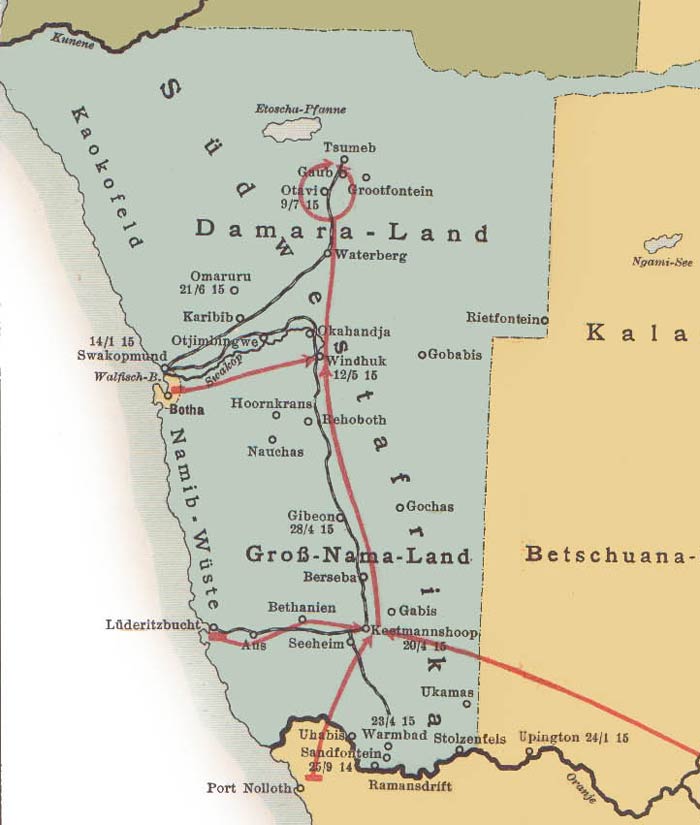 |
| 14/10/2018 |
This part of the country has been called ‘sin, sorrow and sore eyes’, and many men have gone totally blind, so we now use green veils over our helmets and wear smoked glass goggles. These are effective, but are very warm. Many of the stations on the way up from the coast bear amusing names, such as Hotszell – a really truthful description so far as the day is concerned, but at night the cold dew eats into your very marrow bones. From a mining point of view there are great potentialities here. We have struck upon a mica bed, sheets of it being as clear as glass, and we are using them for our goggles as they do not burn.' |
| 06/08/2018 |
From the Mid Ulster Mail dated 3rd April 1915: Dungannon Men Join Botha’s Army |
| 06/08/2018 |
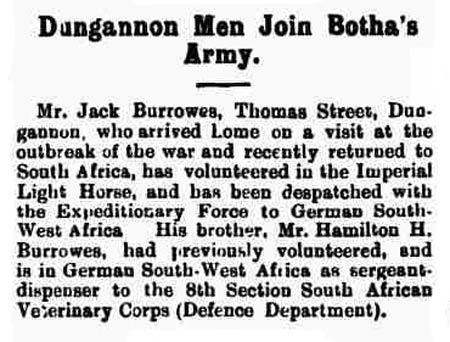 |
| 06/08/2018 |
Mr Jack Burrowes, Thomas Street, Dungannon, who arrived home on a visit at the outbreak of the war and recently returned to South Africa, has volunteered in the Imperial Light Horse, and has been despatched with the Expeditionary Force to German South-West Africa. His brother Hamilton H Burrowes, had previously volunteered, and is in German South-West Africa as sergeant dispenser to the 8th Section South African Veterinary Corps (Defence Department). |
| 30/12/2015 |
On Saturday, Mrs Burrowes, 'Hillside' Dungannon, received intimation from the War Office, that her second son Trooper Jack Burrowes, 4th South African Horse, had died on 23rd December from a malignant fever contracted during the present arduous campaign in German East Africa. The deceased soldier, who had been in business in Dungannon, had emigrated to South Africa several years ago where he entered into trade in Johannesburg and had considerable farming interests up country. He arrived home on a visit at the time war was declared and promptly returning to South Africa, volunteered in the Imperial Light Horse and served under General Botha throughout the successful German South West Africa campaign. At its conclusion, he re-volunteered for active service in German East Africa and joined the 4th South African Horse and until his fatal illness, had participated in the victorious campaign in that country. He had been a member of St John's Masonic Lodge No 185, Dungannon, for the past ten years and was a great favourite in his native district. Mrs Burrowes unfortunately sustained a second bereavement recently as her youngest son, Mr Hamilton S Burrowes, who had also served throughout the German South west campaign in the Veterinary Corps, was accidentally killed in Johannesburg in August last. |
| 30/12/2015 |
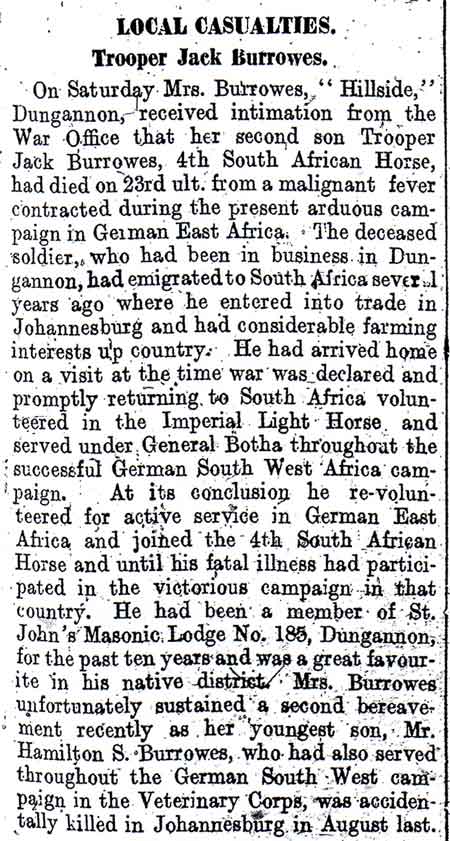 |
| 30/12/2015 |
From the Tyrone Courier dated 4 January 1917: Trooper Jack Burrowes |
| 30/12/2015 |
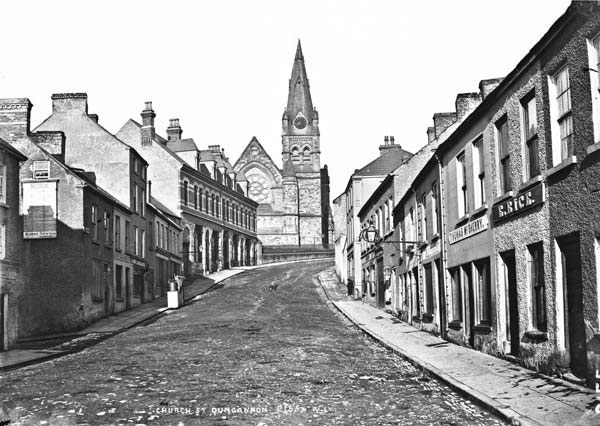 |
| 30/12/2015 |
Jack Burrowes arrived home on a visit, at the time war was declared and promptly returning to South Africa, volunteered in the Imperial Light Horse and served under General Botha throughout the successful German South West Africa campaign. |
| 30/12/2015 |
Corporal John Burrowes was with 'A' Squadron. 4th South African Horse when he died from a malignant fever contracted during the arduous campaign on 23rd December 1916, age 33. |
| 30/12/2015 |
'We are still pegging away, and hope to have this corner of Africa cleaned up shortly. News reaches us from the outside world very slowly, as we are far away from railroads. This is a remarkable country in many ways, and almost unknown in parts. It is really a natural zoo, and the scenery is everywhere strange and the climate tropical. Fever is very prevalent, and I think we have all had it.' |
| 30/12/2015 |
The 1911 census does not list John as living with his widowed mother in Thomas Street, South Side, Dungannon. |
| 30/12/2015 |
Corporal John Burrowes is buried in Dar Es Salaam War Cemetery, Tanzania, Africa. |
| 30/12/2015 |
At the conclusion, of the South West Africa campaign, he re-volunteered for active service in German East Africa and joined the 4th South African Horse. |
| 30/12/2015 |
John Burrowes’ brother, Hamilton Burrowes, who had also served throughout the German South west campaign in the Veterinary Corps, was accidentally killed in Johannesburg in August 1916. |
| 30/12/2015 |
From the Mid Ulster Mail dated Saturday 1st July 1916: Trooper Burrowes in German East Africa |
| 30/12/2015 |
Trooper Jack Burrowes, Thomas Street, Dungannon, who is serving with the South African Horse in German East Africa, writing to his friends in Dungannon says:- |
| 30/12/2015 |
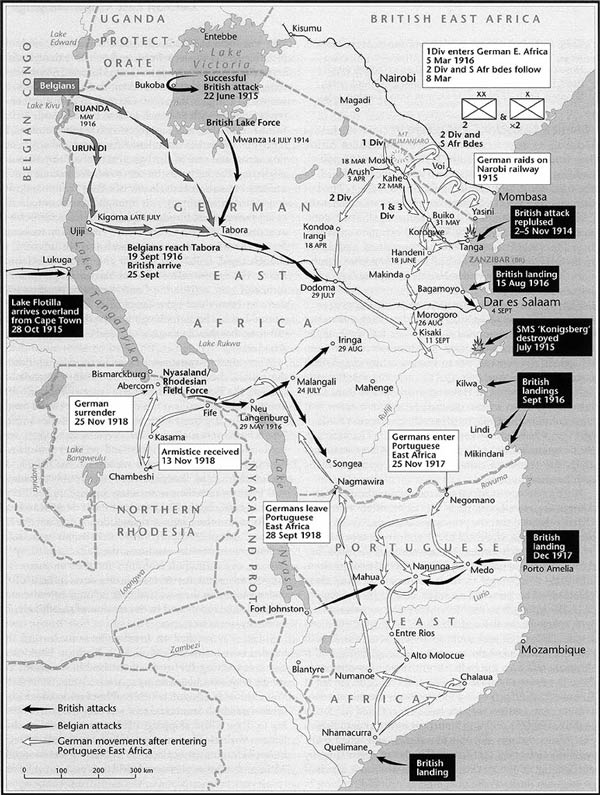 |
| 30/12/2015 |
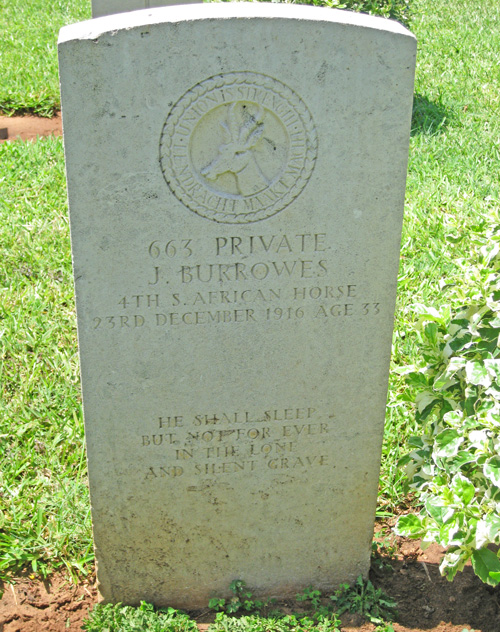 |
| 30/12/2015 |
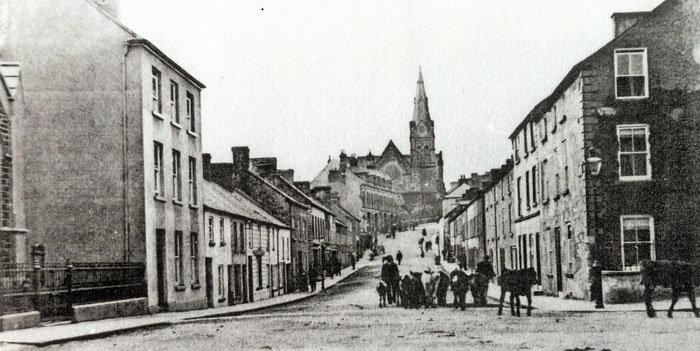 |
| 30/12/2015 |
The 1910 Ulster Towns directory lists William Burrows as being a confectioner and having a posting establishment at Church Street, Dungannon. |
| 30/12/2015 |
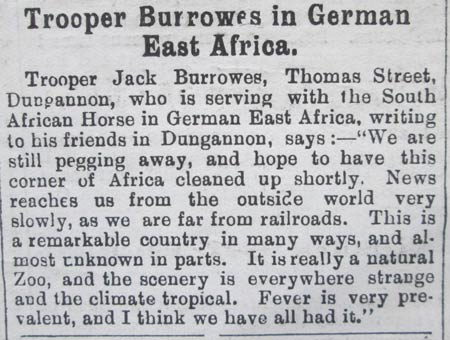 |